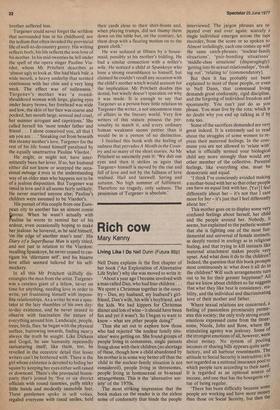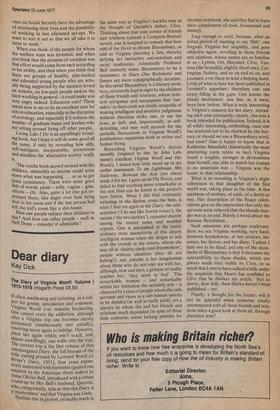Rich cow
Mary Kenny
Living Like I Do Nell Dunn (Future 85p) Nell Dunn explains in the first chapter of her book ('An Exploration of Alternative Life Styles') why she was moved to write it: 'About a year ago I became involved with a man called Dan, who had four children . . . We spent a Christmas together in the country — Dan, my husband, my husband's girlfriend, Dan's wife, his wife's boyfriend, and the kids. We had kippers for Christmas dinner and lots of wine — it should have been fun and yet it wasn't. So I began to want to know — what are other people doing?'
Thus she set out to explore how those who had rejected 'the nuclear family situation' were getting on. She found groups of people living in communes, single parents living alone with their children (no shortage of these, though how a child abandoned by his mother is in some way better off than the child in the nuclear-family situation is not considered), people living in threesomes, people living in homosexual or bi-sexual arrangements. This is the 'alternative society' of the 1970s.
The most striking impression that the book makes on the reader is in the airless sense of conformity that binds the people interviewed. The jargon phrases are repeated over and over again: scarcely a single individual emerges across the tap( recorder, from the score or so spoken to Almost unfailingly, each one comes up witt the same catch-phrases; 'nuclear-famil) situations', 'pair-bonding situations' 'middle-class situations' (disparagingly) 'getting into bi-sexual relationships', 'freaking out', 'relating to' (commendatory).
But then it has probably not been explained to most of these people, or even to Nell Dunn, that communal living demands great conformity, rigid discipline, and the forgoing of individual freedom and spontaneity. You can't just do as you please. You must live by the rota; which is no doubt why you end up talking as if by rota too.
Some of the sacrifices demanded are very great indeed. It is extremely sad to read about the struggles of some women to repress their maternal feelings. In the commune you are not allowed to 'relate with' what is officially termed your biological child any more strongly than would any other member of the collective. Parental feelings, like everything else, must be democratic and equal.
'I think I've consciously avoided making a mother-bond with her so that other people can have an equal link with her. [Yet] I feel differently about her — it's not that I care more for her — it's just that I feel differently about her.'
This mother goes on to display some very confused feelings about herself, her child and the people around her. Nobody, it seems, has explained to the pathetic woman that she is fighting one of the most fundamental and universal of female instincts, as deeply rooted in zoology as in religious feeling, and that trying to kill instincts like maternal attachment makes people very upset. And what does it do to the children? Indeed, the question that this book prompts most continuously is: what does it all do to the children? Will such arrangements turn out to be for their greater happiness? All that we know about children so far suggests that what they like best is consistency, stability, and the individual and discriminating love of their mother and father.
Where sexual relations are concerned, a feeling of passionless promiscuity permeates this society; the only truly strong erotic emotions expressed came from the threesome, Nicole, John and Rose, where the stimulating agency was jealousy. Some of the strongest emotions of all, however, were about money. No system of pooling incomes or sharing bills appears quite satisfactory, and all harbour resentments. The attitude to Social Security is instructive; it is not regarded as a national insurance pool to which people turn according to their need. It is regarded as an optional source of income, and one that has the bourgeois virtue of being regular.
'There has been difficulty because some people are working and have more moneY than those on Social Security, but then the ones on Social Security have the advantage of structuring their lives and the possibility of working in less alienated set-ups. We want to sort it out so that we all take it in turns to work.'
When you think of the people for whom the welfare state was invented, and when you think that the promise of socialism was that effort would come from each according to his ability, and then when you think that there are groups of healthy, able-bodied and educated young people who are actu
allY being supported by the taxation levied on widows, on low-paid people and/on the
hard-working in general — it could make you
very angry indeed. Education cuts? There seems now to me to be an excellent case for
cuts in education, especially in the discipline of sociology, and especially if it reduces the number of graduate bums and leeches who are sitting around living off other people.
Living Like I Do is an appallingly irritating book, but I hope it will do some good all the same, if only by revealing how silly, self-indulgent, irresponsible, pretentious and mindless the 'alternative society' really 'The creche book moved around with the Children, ostensibly so anyone could write down what was happening . . so as to get s'n. me consistency. There were some good lists of words; penis — willy, vagina — gina, Clitoris — cut. Also, quite a lot else got expressed there, like anger over Sam being Shut in his room and if the last person had left the kid's room like a shit-house.' How can people subject their children to this? And how can other people — such as Nell Dunn — consider it admirable?















































 Previous page
Previous page